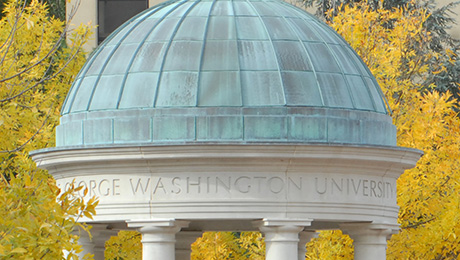A report from the Aspen Institute’s Impact Careers Initiative examining post-graduation employment statistics showed George Washington produces the second highest number of service professionals among national universities.
The report “Higher Education and Social Impact: Which Colleges and Universities Develop the Next Generation of Leaders for Nonprofits and Government?” analyzed how many graduates from top universities and liberal arts colleges go into service careers. From 2000 to 2010, 31.1 percent of GW graduates entered government, education or nonprofit fields.
Washington Monthly highlighted the Aspen Institute study and the university’s broader efforts and initiatives to promote civic engagement.
“President Steven Knapp has made service a ‘Presidential Priority,’ and in the school’s recent strategic plan nearly a third of the listed objectives fell under the category of ‘Citizenship and Leadership,’ ” the article said.
“This is great recognition of the work many people, schools and departments at GW have done,” said Amy Cohen, executive director of the Center for Civic Engagement and Public Service. “Our professional, graduate and undergraduate programs have all contributed to this outstanding performance.”
She explained that at GW the Center for Civic Engagement and the Center for Career Services work together to support service learning by connecting students with public and private nonprofit sector employment, internships and national programs like AmeriCorps and the Peace Corps. Because of its location at the heart of the nation’s capital, George Washington gives students the opportunity to learn about service from neighboring resources, nonprofits and political organizations, Ms. Cohen said.
“Students participate in community service through federal work-study jobs, internships, and volunteer and community service experiences. They participate in philanthropy, in advocacy and in politics,” Ms. Cohen said.
Students also participate in a number of activities designed to promote service. GW’s Freshman Day of Service and Convocation is an annual tradition that this year mobilized more than 2,400 students, who got involved in schools, veteran’s retirement facilities and community centers across all eight wards of D.C. At the inaugural Freshman Day of Service in 2009, First Lady Michelle Obama challenged the university to complete 100,000 hours of community service—a number GW has more than doubled several years in a row.
Approximately 200 incoming freshmen participate in Community Building Community, a pre-semester service and leadership program that introduces students to civic engagement in the local D.C. community.
A new program, engageDC, offers ongoing service opportunities for about 80 students who are in the Center for Civic Engagement service leadership program. Other efforts, like GWupstart, encourage students to use their entrepreneurial skills to change the world and put ideas into action. GWupstart helps undergraduate and graduate students create solutions to local and global problems through co-curricular programs, special events and mentorship from experts. The program also provides guidance for students interested in applying to the GW Business Plan Competition, the Clinton Global Initiative University and other local and national funds.
“All of these programs, and many more, support GW students in their drive to become active citizens and responsible leaders. These programs help develop problem-solving, critical-thinking teamwork and intercultural-communication skills that employers look for in hiring,” Ms. Cohen said.
GW also merges service with academic curricula. Students “put their knowledge into action” in courses like University Writing 1020. Throughout several seminars, students fine-tune their communication skills with activities like preparing brochures for community organizations.
The university’s focus on globalization, another pillar of the strategic plan, also gets students thinking about how to engage—not just locally, but with the international community.
“Our students are interested in receiving an education that allows them to contribute and practice the skills of democratic citizenship immediately, even as they work to improve their skills for greater leadership in the future,” Ms. Cohen said. “They come to us with an interest in developing and building their knowledge and skills so that they can make a difference in the world. GW helps them hone and shape their experiences to do so.”


